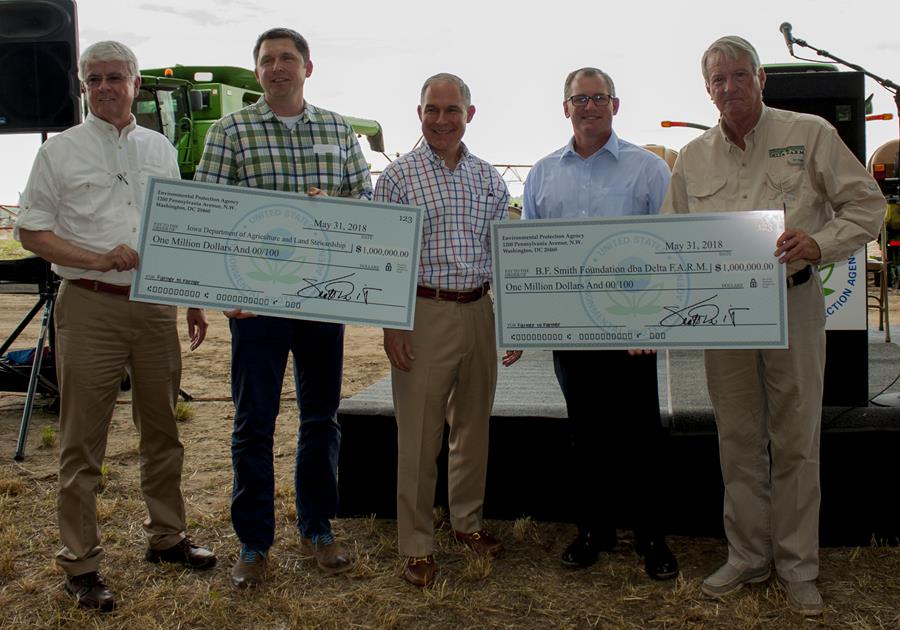U.S. Environmental Protection Agency (EPA) Administrator Scott Pruitt joined over 50 farmers and landowners to announce two Gulf of Mexico Program grants totaling $2 million. During his time in the Mississippi Delta, Pruitt also toured Big River Farms and met with members of Mississippi agriculture community to discuss pollinator health and water quality.
“This funding will empower those on the ground in the states to improve water quality and crop production in the Mississippi River Basin,” said EPA Administrator Scott Pruitt. “EPA is committed to working cooperatively with our state and local partners to support American agriculture and protect our vital water resources.”
Pruitt was joined by EPA Region 4 Administrator Trey Glenn and presented the B.F. Smith Foundation and the Iowa Department of Agriculture and Land Stewardship with grants, each $1 million.
“Mississippi farmers and ranchers are the backbone of our economy,” Said Governor Phil Bryant. “Today’s grants provide the necessary support from Administrator Pruitt and our federal partners as we work together to improve our state’s water quality, strengthen agriculture, and protect the environment.”
Following the grant announcement, Administrator Pruitt and members of the Mississippi agriculture community toured Big River Farms in Bobo, Miss. During the tour of a soybean field, Administrator Pruitt and members of the Mississippi agriculture community and discussed a variety of pollinator issues and water quality projects in the area and the impact it has on agricultural systems. Pruitt also spoke at the Delta Council’s annual meeting during his time in Mississippi to talk about EPA’s accomplishments in the last year.
“Mississippi farmers know successful agricultural production relies on good stewardship of our land and water resources. This EPA grant will support efforts in the Mississippi Delta to find practices to help increase yield while promoting practices that will benefit the environment overall,” said U.S. Senator Cindy Hyde-Smith. “I appreciate the cooperative nature of this award and thank Administrator Pruitt for his support of farmers in our state.”
The grants will go towards projects that demonstrate innovative monitoring systems that will measure and report field scale water and nutrient dynamics to the farmer in support of informed crop management decisions throughout the Delta region. Also, the projects take a multi-stakeholder approach to improve surface waters in Iowa and ultimately the Mississippi River Basin.
“Mississippi’s farmers rely upon the latest technology and research to improve their production processes, lower prices for consumers, and stay competitive in a global market,” said Senator Roger Wicker. “These grants from the Environmental Protection Agency will help the B.F. Smith Foundation, Delta Council, and others to develop farming methods that will improve water quality and increase profitability for hundreds of farmers in the Mississippi Delta. I extend my personal thanks to Administrator Pruitt for his leadership and for making the trip to Mississippi to present these important awards.”
The Clean Water Act provides authority and resources that are essential to protecting water quality in the Gulf of Mexico and larger Mississippi River Basin. EPA’s regional offices and the Gulf of Mexico Program work with states to continue to maximize the efficiency and utility of water quality monitoring efforts for local managers by coordinating and standardizing state and federal water quality data collection activities in the Gulf region. Enhanced monitoring and research is needed in the Gulf Coast region to make data more readily available.
“It is encouraging to farmers and all of the allied agricultural businesses in this country to know that Administrator Pruitt is focused on important issues that effect this industry,” said Delta Farmers Advocating Resource Management Chairman Dan Branton. “Spending time ‘in-the-field’ with real farmers on working lands is the only way to truly understand some of the environmental issues this industry faces.”




